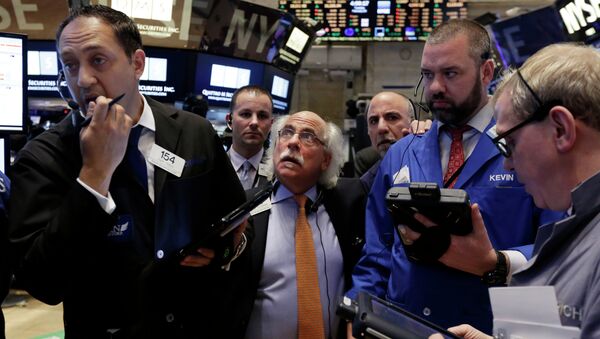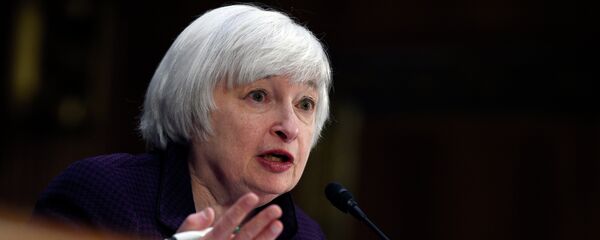Stock markets in Europe closed in the red on Wednesday after US Federal Reserve chair Janet Yellen had proven to be dovish towards matters concerning monetary policy. In her Congressional testimony, she made it clear that further monetary tightening is not likely to occur any time before June, to investors' relief in America. However, in Europe, stocks retreated on the news, as investors turned their eyes to American stocks, which promised higher returns. Germany even started selling 5-year bonds with negative (!) yields: investors will have to pay to lend money to Berlin.
The Stoxx Europe 600 Index retreated 0.1% as the energy sector, commodities and consumer goods all posted losses. The negative dynamics the index posted ended its almost month-long rally, which started in late January. On Tuesday the pan-European index hit its 8-year record high, having exceeded its pre-crisis valuation.
European stocks "look alluringly inexpensive relative to their peers, with the region trading at a record discount to U.S. stocks on a 5-year through the cycle [price-earnings] basis since 1970," Matt Sherwood of Perpetual noted on Tuesday.
The undervaluation in European stocks is best explained by insufficient growth in the Eurozone, the constant threat of deflation, the low scale of the European Central Bank’s (ECB) stimulus and, most recently, the Greek risks. Investors prefer safer assets, like US stocks, the US dollar, US treasuries, and, until the recent US Department of Justice probe into several major banks in relation to their alleged rigging of precious metal prices, gold.
In Paris, CAC 40 shed 0.1%, the German DAX added 0.04%, while in London, the FTSE 100 lost 0.2%. Russia’s Micex lost 1.4% on concerns linked to risks posed by the Ukrainian revolutionary war.
Concerns of a slow expansion in the housing sector have prompted the Fed to hold on with raising interest rates. "Housing has not been all that strong," Nick Raich, CEO of The Earnings Scout, said. "That's going to potentially cause the Fed to play a bit of a waiting game."
Asian markets have been flat, hovering at their 5-year highs in some cases, as moderately optimistic data from the US, Ms. Yellen's dovish testimony and mixed results among the previous day's trades on Wall Street left Asian investors confused. The dollar retreated, however, to Japan’s disappointment.
MSCI’s Asia-Pacific ex-Japan was little changed, while Japan’s Nikkei 225 edged up 0.2%. "On the whole, the world's markets seem likely to be in a risk-on mode. The valuation still looks not that expensive, except for U.S. markets," Hirokazu Kabeya of Daiwa Securities told Reuters.
Meanwhile, China's Premier Li Keqiang announced more unconventional monetary policies might be necessary to spur the nation’s stagnant economy. Tax breaks for small businesses are being considered among other measures, however, no full-scale bond-buying or money printing can be expected at this point – only yet another cut in commercial banks' required reserve ratios (RRRs) would be introduced as an anti-deflation measure.
As a result, Japan’s broader Topix Index hit its 7-year high, adding 0.4%, while Hong Kong’s Hang Seng advanced 0.1%.





